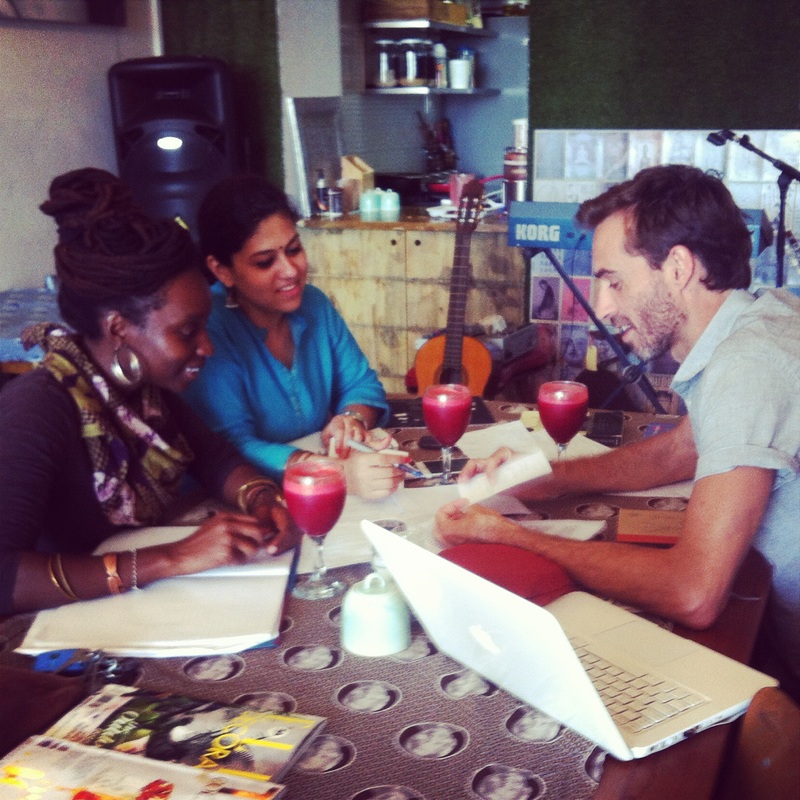Meeting 2 - Cape Town
11th - 13th February 2015
A second smaller meeting was held in Cape Town, and included Dr Dylan McGarry, Injairu Kulundi (Activate) and Deepika Joon (Mahatma Ghandi Institute of Education for Peace and Sustainable Development), with a focus on youth.
Short report from the meeting with Deepika Joon, Injairu Kulundu and Dylan McGarry, by Dylan McGarry
Over this week, we have made some really productive headway in coming to understand how we will explore the role of Youth in transgressing boundaries and transformative learning, and between Injairu, Deepika and my own work we have gathered together a much clearer perspective.
As part of the proposal development process the Transgressive learning network will be putting together a special edition of the South African Environmental Education Journal, which will include 'think peices' and case studies from all those involved in the network .... We came to see that there is a great deal of potential to focus on the YESPEACE network as a primary context to explore the development of agency and capacities within young people involved in the network, and what does or does not encourage transgressive agency. We agreed that it would be important to use a central framework to track learning and agency from individuals involved in the programme, up to the groups themselves, and then YESPEACE’s work into other institutional arrangements within MGIEP’s programs. This scale and context of YESPEACE and MGIEP within the wider international context will be a refreshing and unique perspective for the T-Learning network.
Another point which we found useful was to critically examine the dangers of separating out youth as a specific group, as it often can lead to people thinking about the youth as ‘special needs’ or what Injairu calls’ the “Ghettoization of the Youth”… i.e. a catergorization that is not always helpful or emancipatory for young people. A useful way to respond to this was to focus on the idea of ‘citizenship as agency’ framed by Heila, in which when we focus on young citizens as apposed to youth specifically, there is an inherent consideration of learning and agency when we consider citizenship.
Although our framing or definition of citizenship is perhaps not the same as that which has been discussed in the GCED or in traditional concepts of citizenship, here we are creating the space to explore a more nuanced definition, which focuses on the embodied citizen, who is both ecological, social, intuitive, imaginative, reflexive, creative, innovative and empathetic - with further exploration into embodied ecological citizenship, which I examined rigorously in my doctoral research.
Over this week, we have made some really productive headway in coming to understand how we will explore the role of Youth in transgressing boundaries and transformative learning, and between Injairu, Deepika and my own work we have gathered together a much clearer perspective.
As part of the proposal development process the Transgressive learning network will be putting together a special edition of the South African Environmental Education Journal, which will include 'think peices' and case studies from all those involved in the network .... We came to see that there is a great deal of potential to focus on the YESPEACE network as a primary context to explore the development of agency and capacities within young people involved in the network, and what does or does not encourage transgressive agency. We agreed that it would be important to use a central framework to track learning and agency from individuals involved in the programme, up to the groups themselves, and then YESPEACE’s work into other institutional arrangements within MGIEP’s programs. This scale and context of YESPEACE and MGIEP within the wider international context will be a refreshing and unique perspective for the T-Learning network.
Another point which we found useful was to critically examine the dangers of separating out youth as a specific group, as it often can lead to people thinking about the youth as ‘special needs’ or what Injairu calls’ the “Ghettoization of the Youth”… i.e. a catergorization that is not always helpful or emancipatory for young people. A useful way to respond to this was to focus on the idea of ‘citizenship as agency’ framed by Heila, in which when we focus on young citizens as apposed to youth specifically, there is an inherent consideration of learning and agency when we consider citizenship.
Although our framing or definition of citizenship is perhaps not the same as that which has been discussed in the GCED or in traditional concepts of citizenship, here we are creating the space to explore a more nuanced definition, which focuses on the embodied citizen, who is both ecological, social, intuitive, imaginative, reflexive, creative, innovative and empathetic - with further exploration into embodied ecological citizenship, which I examined rigorously in my doctoral research.


